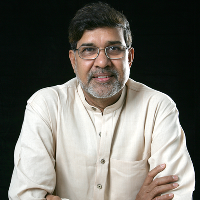Indian and Pakistani Share Nobel Peace Prize, Both Govts Need to Talk Peace Too
 Nobel Peace Prize co-winner Kailash Satyarthi
Nobel Peace Prize co-winner Kailash Satyarthi
The Nobel Prize committee delivered some good news to the Indian subcontinent on Friday when it awarded the 2014 Peace Prize to children’s rights activists Kailash Satyarthi and Malala Yousafzai. The committee said it was important that a Hindu and a Muslim, an Indian and a Pakistani, had joined in what it called a common struggle for education and against extremism.
While there were raised eyebrows over the Nobel committee’s use of religion to describe the identity of the awardees, this year's prize is seen as an uncontroversial choice by the Norwegian committee.
Satyarthi dedicated the Nobel Peace Prize to children in slavery, pledging on Friday to "join hands" with fellow laureate Malala at a time when India and Pakistan are exchanging fire along a 200 km stretch of border.
Satyarthi was recognised for his battle against child trafficking with his group Bachpan Bachao Andolan – or Save the Childhood Movement – that he founded in 1980 after quitting his job as an electrical engineer.
"It's a great statement from the Nobel committee, looking at the present scenario in India and Pakistan," he told reporters at his office in New Delhi.
"Beside our fight against child slavery and against the menace of illiteracy on the subcontinent and globally, we hope both of us will be able to fight for peace," Satyarthi said, referring to Malala.
"I will invite her (Malala) to join hands to establish peace for our subcontinent - which is a must for children, which is a must for every Indian, for every Pakistani, for every citizen of the world," he added.
India and Pakistan have been engaged in heavy shelling across the border in the state of Jammu and Kashmir for more than a week, killing nine Pakistani and eight Indian civilians in the worst violence in more than a decade.
Prime Minister Narendra Modi, who has taken a tough line on Pakistan since his election victory in May, congratulated Satyarthi.
"Kailash Satyarthi has devoted his life to a cause that is extremely relevant to entire humankind. I salute his determined efforts," Modi said in a tweet. He also described Malala's life as "a journey of immense grit & courage".
The Nobel Prize announcement may just give both countries the space required to de-escalate the violence at the border.
According to Reuters, Satyarthi estimates that 60 million children in India, or 5 percent of the population, are forced into work. He dedicated his award to them: "It's an honour to all those children who are still suffering in slavery, bonded labour and trafficking," Satyarthi told CNN-IBN.
The 60-year old is credited with freeing tens of thousands of children working as cheap labour in homes, factories and construction sites. In an operation in May, police rescued 63 children and arrested 23 suspected child traffickers at Delhi railway station, acting on a tipoff from Satyarthi.
According to the Global Slavery Index 2013, around 30 million people are enslaved worldwide, trafficked into brothels, forced into manual labour, victims of debt bondage or even born into servitude. Almost half of these modern slaves are in India.
"It's not just about India," Satyarthi told Reuters. "It's a crime against humanity if a child is deprived of childhood - in my country or any country in the world. Humanity is at stake."
Satyarthi and Malala will attend the award ceremony in Oslo in December to receive a medal and $1.4 million in prize money. If Modi and his counterpart Nawaz Sharif attend as well, the opportunity for some renewed peace between the two neighbours may just be possible.
- Karan Singh
To Learn More:
Malala and Kailash Satyarthi win Nobel Peace Prize (BBC News)
Indian peace laureate Kailash Satyarthi to "join hands" with Pakistan's Malala (by Krista Mahr, Reuters)
Why Kailash Satyarthi deserves the Nobel peace prize (Hindustan Times)
Malala wants Modi, Sharif to attend Nobel Award ceremony (by Prasun Sonwalkar, Hindustan Times)
- Top Stories
- Controversies
- Where is the Money Going?
- India and the World
- Appointments and Resignations
- Unusual News
- Latest News
- India College Chain’s Expansion into U.S. Draws Opposition from Massachusetts Officials over Quality of Education
- Milk Shortages in India Tied to Release of New Movies Featuring Nation’s Favorite Stars
- Confusion Swirls around Kashmir Newspaper Ban in Wake of Violent Street Protests
- Polio-Free for 5 Years, India Launches Vaccine Drive after Polio Strain Discovery
- New Aviation Policy Could Increase Service, Lower Ticket Prices






Comments